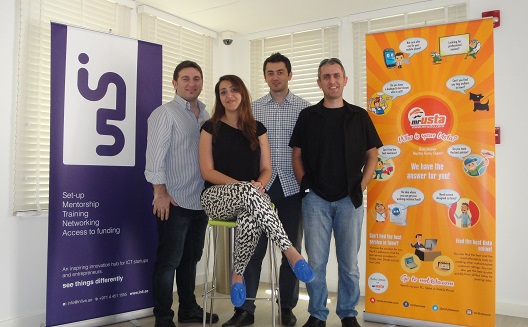From plumbers to cake decorators, can Mrusta provide the quick fix for Dubai’s expats?

While sitting at the Business Development table during Mix N’ Mentor Dubai, two entrepreneurs caught my attention: Ibrahim Colak and his wife Dunia Othman, the cofounders of Mrusta, an online marketplace in UAE that links residents with different service providers.
During the one-hour session, it was obvious to me that the two had a clear business model and a realistic approach to challenges and success. After the session ended, Colak and I chatted for a bit, and decided to reconnect over Skype a few weeks later.

“Usta means master, guru, or expert in Turkish. It is also used in Iraq and the Gulf in old Arabic,” explained Colak during our interview. In this context, Usta means service provider.
Born and raised in Istanbul, Colak studied electrical engineering and earned a master’s degree before accepting a job at Nokia. After eight years, he moved to Nokia Dubai and worked on product marketing for the Middle East, Africa, and India. As a new resident in Dubai, it wasn’t easy for him to find service providers. “My AC broke down as the days were getting warmer,” he recalls. “After over 24 hours with no air conditioner in May [when temperatures in Dubai reach average highs of 37°C and 99°F] I was desperate; but the repairer I contacted didn’t show up and stopped answering my calls, it was a real ordeal.” So it hit him: Why not launch a website “that makes finding service providers in the UAE an easy experience? A site where users share their experiences and help each other make the best choice?”
Everything was in his favor. There was a big gap in the UAE market and his career wasn’t going anywhere. “I wasn’t learning new things at Nokia. The company was going down. So I left.”
In the summer of 2013, Colak started working on his idea, developing an online platform linking new UAE residents to ustas. In January 2014, Mrusta launched with the help of three other team members: his wife Dunia Othman, who serves as chief marketing officer, Onur Tepeli, the CTO, and Serhan Yacizi, the CFO.
When demand and offer meet
When visiting Mrusta.com, users can choose from 3,000 service providers in more than 200 categories such as air conditioning, technicians, plumbers, phone repair, cleaning and maid services, dance classes, and many others. Each category lists the contact information and location of the ustas. The site has now over 17,000 page views per month, according to Colak, and their most popular categories are cleaning and maid services, which are highly demanded by expats. So far, Mrusta has 2,900 listed ustas, of which 10% are active, according to Colak. “We are seeing very positive traction on the site. There’s been a 32 percent increase from Q2 to Q3 of 2014.”

and Dunia Othman (second from left).
The team gets leads from customers, and reaches out to marketing agencies as well. After they first get in touch with an Usta, they visit their location, take pictures, and send them a full presentation of how Mrusta works, in addition to getting them set up with an account on the site. “We are not charging anyone yet because it’s a new concept for service providers. We are educating them,” commented Colak when I asked how they are making money. “When our new model is ready, we will visit the ustas one by one and show them how they’ll benefit from using the website.” They plan on charging service providers starting in April of this year.
Their revenue model will allow the startup to take between 2 to 3 Emirati dirhams for every call the usta gets. In order to track calls, Mrusta will be working with local telecoms such Du and Etisalat so as to deduct the commission directly from ustas’ phone bills.
With every entrepreneurial journey comes a fair share of challenges and hardships. Mrusta is no exception. Here’s a summary of the main issues the team has faced:
Setting up the company in the UAE was a hassle. “It’s not easy when you have to pay license fees. You need to [reserve as much money as possible] for marketing,” he says. “We applied to in5 and they helped us a lot with the license fees and gave us access to a shared office.”

Marketing is costly. “We had roll-up banners for events and branded cars and these are expensive. Mrusta was chosen along with two startups to participate in a two-day boot camp and won $20,000, which helped defray these costs.
Development was slow because everything is done in-house. Since CTO Tepeli is handling all development work, any change in the business model or website will require a lot of time to implement.
Media exposure, “but thanks to Afkar and in5, we are getting good attention.”
Educating service providers. “They are small and most of them are micro businesses which aren’t used to having online customers,” he says. “They are used to Dubizzle [the free classifieds website].”
The team is now looking to fundraise; they need $200,000 to put towards marketing – online and offline – and sales. In 2016, they plan to expand to Saudi Arabia, developing an Arabic site, and launching a mobile app.

Leave a Reply